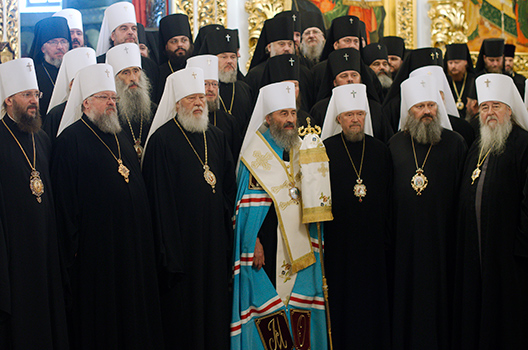
Ukrainians’ Traditional Loyalty to Moscow Patriarch is Strained by His Close Tie to Kremlin
The longstanding divide between Ukraine’s two main Orthodox churches will continue with little change following the election yesterday of a new leader, or metropolitan, by the Moscow-aligned faction. Metropolitan Onufriy is a religious conservative loyal to his church’s formal subordination to the Russian Orthodox Church in Moscow and its primate, Patriarch Kirill.
The pro-Ukrainian rival church, whose Patriarch Filaret is based in Kyiv, reacted with pessimism to Onufriy’s election over other candidates whom analysts say would have been more open to steps toward healing the rift. The Ukrainian Orthodox Church of the Kyivan Patriarchate broke away under Filaret from the Russian Orthodox Church when Ukraine became independent from Russian rule in 1992, following the collapse of the Soviet Union.
The Kyiv-based church and many Ukrainians oppose the idea of remaining subordinate to the Moscow Patriarchate in part because Patriarch Kirill has been seen as politically subservient to the government of President Vladimir Putin, even as the Kremlin this year invaded Crimea from Ukraine and fomented the four-month-old war in southeastern Ukraine.
Russian Church and Kremlin
Kirill has echoed the Kremlin in describing Ukraine’s violence as an “internal political crisis.” Russian political analyst Dmitry Oreshkin said in March that “on Ukraine, as elsewhere, the Russian Orthodox Church these days unfortunately cannot have any stance different from the state’s one because it is becoming more and more an instrument of state policy.”
Still, the Russian-aligned church claims control of most parishes (about 11,000) and is the church formally recognized by the international Orthodox hierarchy. The Russian Orthodox Church, by far the largest of the world’s Orthodox communities, has used that weight to prevent formal, canonical recognition of any independent Ukrainian church.
The seventy-four voting bishops of the Ukrainian Orthodox Church elected Onufriy quickly, in its second round of balloting, with forty-eight votes. At sixty-nine, Onufriy is one of the oldest bishops, and served since February as acting leader of the church when his predecessor, Metropolitan Volodymyr, became ill. Volodymyr had led the church Moscow-aligned church since 1992, when Filaret and his more nationalist followers broke away, and walked a neutral, diplomatic line between Ukraine’s nationalism and his spiritual loyalty to Moscow.
Before the bishops voted, Ukrainian President Petro Poroshenko addressed them, saying, “You have a special responsibility to elect a worthy bishop for the ancient Kyiv diocese who will properly continue the good work of his grace late Metropolitan Volodymyr.”
Church’s Ukrainian-ness
With Onufriy’s election, the Moscow-aligned “Ukrainian Orthodox Church may not become as Ukrainian as we would like it to be. However, it will at least stay as Ukrainian as it happens to be today,” said Ukrainian theologian and analyst Yuriy Chornomorets.
Onufriy said following his election that dialogue with the Kyiv-based church will continue, although he stressed the need to maintain the church’s canonical legality, meaning its subordination to Moscow. His spokesman, Heorhiy Kovalenko, said that unity of Ukrainian orthodoxy is a priority for Onufriy, but not as a matter of political expediency. The influence of politics on church matters must be reduced, he said in a statement on the church’s web site.
Chornomorets expressed doubts that Onufriy would open an effective dialogue with other branches of orthodoxy in Ukraine.
‘Russian World’
The Kyiv Patriarchate reacted pessimistically to Onufriy’s election. Its spokesman, Yevstratiy Zoria, said the Moscow-aligned church had opted to be part of the “Russian world” – the cultural and religious space dominated by the Kremlin and the Russian Orthodox Church and promoted by conservative Russian ideologues. “The moderate position of the late Metropolitan Volodymyr has seen its ultimate end. The bishops of this church have decided to be a Russian church in Ukraine, rather than to be a Ukrainian church. This will not help to united the orthodox churches in Ukraine,” Zoria said in an interview with Radio Liberty.
Onufriy was born on November 5, 1944 as Orest Berezovsky, the son of a priest, in the Chernivtsi region of southwestern Ukraine. After embarking on a technical university education, he transferred to the Moscow Seminary, from which he earned a PhD in 1988. Onufriy has been an archbishop since 1994 and a metropolitan since 2000.
Just two hours after his election, Onufriy was recognized as the new leader by Russian Orthodox Patriarch Kirill.
Irena Chalupa covers Ukraine and Eastern Europe for the Atlantic Council.
Image: Metropolitan Onufriy (C) of Chernivtsi and Bukovyna surrounded by bishops at the Kyiv Pecherska Lavra monastery after his election as Primate of the Ukrainian Orthodox Church of the Moscow Patriarchate on August 13, 2014. REUTERS/Maxim Shemetov
